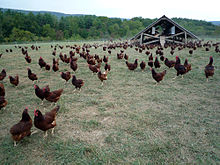
Polyface Farm
| Polyface Farm | |
|---|---|
 | |
 | |
| Town/City | Swoope, Virginia |
| Country | United States |
| Coordinates | 38°07′23″N 79°13′23″W / 38.1230°N 79.2230°W |
| Established | 1961 |
| Owner | Joel Salatin |
| Area | 500-acre (2.0 km2) |
Polyface Farm is a farm located in rural Swoope, Virginia, run by Joel Salatin and his family. The farm is driven using unconventional methods with the goal of "emotionally, economically and environmentally enhancing agriculture". This farm is where Salatin developed and put into practice many of his most significant agricultural methods. These include direct marketing of meats and produce to consumers, pastured-poultry, grass-fed beef and the rotation method which makes his farm more like an ecological system than conventional farming. Polyface Farm operates a farm store on-site where consumers go to pick up their products.

Practices and background

Salatin encourages people to buy locally to save small businesses. Salatin believes it is advantageous for consumers to know their farmers and where their food comes from.[1]

Salatin says that his Christian faith informs how he raises and slaughters the animals on his 500-acre (2.0 km2) farm. He sees it as his responsibility to honour the animals as creatures that reflect God's love and believes his method is to honour that of God. Salatin is quoted in the book The Omnivore's Dilemma as justifying the killing of animals for meat because "people have a soul, animals don't...When they die, they die."[2]

Salatin bases his farm's ecosystem on the principle of observing animals' activities in nature and emulating those conditions as closely as possible. Salatin grazes his cattle outdoors within small pastures enclosed by electrified fencing that is easily moved each evening in an established rotational grazing system. Animal manure fertilizes the pastures and enables Polyface Farm to graze about four times as many cattle as on a conventional farm, thus also saving feed costs.[3] The small size of the pastures forces the cattle to "mob stock", or to eat all the grass.[4]

Polyface raises cattle, pastured meat chickens, egg layers, pigs, turkeys, and rabbits. The diversity in production better utilizes the grass, breaks pathogen cycles, and creates multiple income streams.[5] The meat chickens are housed in portable field shelters that are moved daily to a fresh "salad bar" of new grass and away from yesterday's droppings. All manure is distributed by the chickens directly onto the field. His egg-laying chickens are housed in mobile trailer-style coops (called "eggmobiles") that follow four days after the cattle when flies in the manure are pupating; the chickens get 15% of their feed from this. While scratching for pupae, the chickens also distribute the cow manure across the field. [citation needed]

Salatin feels that "if you smell manure [on a livestock farm], you are smelling mismanagement." So everything possible is done to allow grass to absorb all the fertilizer left behind by the animals. If animals must be kept inside (to brood young chicks for example), Salatin recommends providing deep bedding of wood chips or sawdust to lock in all the nutrients and smell until they can be spread on the field where the compost can be used by the grass.[6]

Salatin's pastures, barn, and farmhouse are located on land below a nearby pond that "feeds the farm" by using 15 miles (24 km) of piping. Salatin also harvests 450 acres (1.8 km2) of woodlands and uses the lumber to construct farm buildings.[7] One of Salatin's principles is that "plants and animals should be provided a habitat that allows them to express their physiological distinctiveness. Respecting and honouring the bigness of the pig is a foundation for societal health."[8]

While Salatin does not sell to supermarkets or ship long distances,[9] Polyface products are available at restaurants (including Chipotle[10] and Staunton's Zynodoa) and local food sellers within a half-days drive of the farm.[citation needed]

Media
Polyface Farm was featured in the book The Omnivore's Dilemma by Michael Pollan as exemplary sustainable agriculture, contrasting Polyface Farm favorably to factory farming. An excerpt of the book was published in the May/June 2006 issue of Mother Jones. Pollan's book describes Polyface Farm's method of sustainable agriculture as being built on the efficiencies that come from mimicking relationships found in nature and layering one farm enterprise over another on the same base of land. In effect, Joel is farming in time as well as in space—in four dimensions rather than three. He calls this intricate layering "stacking" and points out that "it is exactly the model God used in building nature." "The idea is not to slavishly imitate nature, but to model a natural ecosystem in all its diversity and interdependence, one where all the species "fully express their physiological distinctiveness."[11]

The farm is covered in the August/September 2008 issue of Mother Earth News.[12]

The farm is also featured in the documentary films Food, Inc.[13] and Fresh as well as in episode 3 of the BBC documentary series Jimmy's Global Harvest.[citation needed]

Polyface Farm is a participant in Humane Farm Animal Care's Certified Humane Raised and Handled program.[citation needed]

Salatin and his farm was the main topic of the documentary Polyfaces.[citation needed]

Criticism

Salatin is criticized by poultry farmer Frank Reese in Jonathan Safran Foer's book Eating Animals[14] for raising industrial birds, not heritage birds. Reese says of Polyface, "Joel Salatin is doing industrial birds. Call him up and ask him. So he puts them on pasture. It makes no difference. It's like putting a broken-down Honda on the autobahn and saying it's a Porsche."[15] Salatin maintains that this statement is not entirely true. Polyface uses heritage breeds for its egg production. However, for meat birds Salatin uses the Cornish cross, the same type of bird used in the industrial system. Salatin candidly admits in his book, The Sheer Ecstasy of Being a Lunatic Farmer, that the meat bird operation is currently the least sustainable aspect of the farm. Salatin goes on to say that he looks forward to the day that customers are willing to buy (and he is able to raise) a non-industrial meat bird. Reese's critique also aims at Michael Pollan's view in his book The Omnivore's Dilemma that depicts the farming principles of Polyface as exemplary and sustainable. Salatin confirmed, in an interview with The Observer, that he raises non-heritage breed chickens. He explained that he had raised heritage birds for several years, but the poultry from these birds had gained little interest from consumers, and was therefore not economically viable for him.[16]

The New York Times in their article "Let Them Eat Acorns" quotes unspecified, uncited and unknown individuals: "Some say he is cheating the notion of sustainability by feeding his pigs grain that he does not grow himself. Others contend that confinement operations are the only practical way to feed the world, and that pastured animals do more damage to the environment than is acknowledged in this farm-to-table era."[17]

After Polyface's 2019 growing season, a website went live that claimed to be run by the season's former interns, it is entitled One Experience of Many. The website includes both positive and negative reviews of the farm and the family who run it, the reviewers all discuss substandard housing, which is alleged to include known negligence of water quality standards and the poisoning of 10 out of 11 interns. One of the reviewers, Emma, reports two hospital visits due to a bacterial infection from their housing's water supply including a diagnosis of campylobacteriosis. The interns' allegations also include crude and manipulative behavior on the part of farm ownership and management, along with low pay and little educational value.[18]

COVID-19 pandemic
Polyface Farm repeatedly violated COVID-19 pandemic protocols by holding various gatherings. Salatin regularly expressed in his blog "Musings from The Lunatic Farmer" that he believes that COVID is not a danger and that it should not be taken so seriously. He implied that 5G may be the true cause of COVID.[19] In March of 2020, he wrote: "Okay folks, enough is enough. I want coronavirus. I've been watching all the personal stories of the folks who have gotten it and the overwhelming testimony is pretty simple: a day of sniffles, another day of fatigue, then a couple of days of recovery, and life is back to normal."[20] While criticism of Joel Salatin and Polyface for minimizing COVID-19's impact were widespread[21] the farm continued to host large and mostly maskless events well into the fall of 2020.[22]

See also
References
- ^ Laura Bly "Down on the Farm"
- ^ Pollan, Michael (2006). the Omnivores Dilemma. The Penguin Press. p. 331. ISBN 978-1-59420-082-3.
- ^ Farms., Polyface. "Polyface Guiding Principles". Polyface The Farm of Many Faces. Wordpress. Archived from the original on 8 May 2020. Retrieved 27 April 2020.
- ^ "Grazing Patterns". purdue.edu. Retrieved 27 July 2023.
- ^ Salatin, Joel. "Joel Salatin of Polyface Farms discusses grass-fed cattle". Youtube. tedsword. Archived from the original on 2021-12-11. Retrieved 27 April 2020.
- ^ mccune, kathy. "Your Family Cow: Amount Of Manure And What To Do With It!". Family Farm Livestock. Archived from the original on 2022-01-23. Retrieved 2020-04-27.
- ^ " Business Week, August 10, 2007,". Archived from the original on May 23, 2011. Retrieved Jul 6, 2021.
- ^ "Polyface Farm principles". Archived from the original on Mar 24, 2009. Retrieved Jul 6, 2021.
- ^ Pollan, Michael. "No Bar Code". Mother Jones. Archived from the original on 17 May 2014. Retrieved 21 November 2011.
- ^ Black, Jane (26 March 2008). "In Trial Run, Chipotle Heads to the Farm". The Washington Post. Archived from the original on 3 June 2017. Retrieved 21 November 2011.
- ^ Michael Pollan. Omnivore's Dilemma
- ^ Phelps, Megan. "Everything He Wants to Do is Illegal". Mother Earth News. Archived from the original on May 6, 2021. Retrieved Jul 6, 2021.
- ^ "Escapes: Touring Polyface Farm, Which Uses Sustainable Farming Practices - washingtonpost.com". Archived from the original on 2017-10-14. Retrieved 2017-10-28.
- ^ "Good Shepherd Poultry". Archived from the original on 2013-01-24. Retrieved 2010-05-04.
- ^ Jonathan Safran Foer "Eating Animals"
- ^ Wood, Gaby (31 January 2010). "Interview: Joel Salatin". The Guardian. London. Archived from the original on 30 August 2016. Retrieved 16 December 2016.
- ^ Shattuck, Kathryn (Dec 30, 2013). "Let Them Eat Acorns". Archived from the original on January 13, 2022. Retrieved Jul 6, 2021 – via NYTimes.com.
- ^ "Intern Reviews". ONE EXPERIENCE OF MANY. Archived from the original on 2020-11-20. Retrieved 2020-10-07.
- ^ Salatin, Joel. "CIRCULAR DOTS". The Lunatic Farmer. Archived from the original on 2020-11-13. Retrieved 2020-12-20.
- ^ Salatin, Joel. "I WANT CORONAVIRUS!". Musings from The Lunatic Farmer. Archived from the original on 2020-12-05. Retrieved 2020-12-19.
- ^ Carman, Tim. "Famous farmer and activist Joel Salatin gets blowback for declaring: 'I want coronavirus!'". Washington Post. ISSN 0190-8286. Archived from the original on 2021-05-16. Retrieved 2021-03-06.
- ^ "Get Access". The News Leader. Archived from the original on 2023-04-08. Retrieved 2021-03-06.
External links
38°07′23″N 79°13′23″W / 38.1230°N 79.2230°W

See what we do next...
OR
By submitting your email or phone number, you're giving mschf permission to send you email and/or recurring marketing texts. Data rates may apply. Text stop to cancel, help for help.
Success: You're subscribed now !
